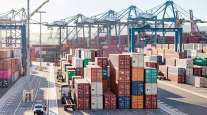Senior Reporter
Port of L.A. Chief Gene Seroka Warns of Damage From Trade War

[Stay on top of transportation news: Get TTNews in your inbox.]
Even as the Trump administration has signed phase one of the trade agreement with China, the executive director of the Port of Los Angeles issued a warning.
In his annual State of the Port address Jan. 16, Gene Seroka cautioned that using tariffs to punish rival trading partners may be “the new normal.”
“We thought Americans needed to know what these policies put at risk: $186 billion in trade value and 1.5 million jobs, with economic impacts in each of our 435 U.S. congressional districts,” Seroka said. “From agriculture to chemical manufacturing, machinery and automotive exports, this trade war has especially hurt a number of California’s business sectors.”

Seroka
Seroka said other ports on the West Coast have been affected as well. Manufacturers, he said, have shifted some of their production from China to other Southeast Asian nations. Those items now are being transported through the Suez Canal and eventually to ports on the East Coast.
“We have seen 14 consecutive months of export declines. That is a challenge,” Seroka said. “So we’re collaborating to adapt to new trade patterns, aggressively pursue export markets and continue to innovate.”
Seroka has been an outspoken critic of the trade war. In mid-November, he hosted a news conference in Washington in which he outlined his concerns and said, long term, the trade dispute could be devastating to ports and the broader economy.
President Donald Trump has said that while he is pleased with the phase one deal, he may wait until after the elections in November to negotiate phase two.
Also, at his speech, the port leader announced a new truck reservation system that is expected to start this year.
At the 2020 State of the Port of Los Angeles event hosted by @PMSAship, Executive Director Gene Seroka announced near-record cargo volumes, initiatives for terminal efficiency, digital leadership and workforce development. #SOTPLA20
Video: https://t.co/qkvxuwRyxM pic.twitter.com/l26jKKmFMu — Port of Los Angeles (@PortofLA) January 17, 2020
“We will bring to our board the nation’s first-ever terminal-efficiency incentive program, including a new Port of Los Angeles truck terminal reservation system,” Seroka said. “Depending on the percentage a terminal can reduce truck turn times, they will be monetarily rewarded on each container unit. The higher the percentage of reduction, the bigger the reward. The program is expected to improve drayage efficiency and further reduce turn times here at the Port of Los Angeles.”
It also was announced the port is working on developing an off-dock chassis yard solution. Marine cargo terminal operator Yusen Terminals has developed a near-dock chassis staging area, and the port is negotiating with Pacific Crane Maintenance Co. to develop an off-dock facility to complement APM Terminals’ operation.
APM Terminals is an international company that provides cargo support and container inland services. It is the world’s fifth-largest container terminal operator, according to the Annual Review of Global Container Terminal Operators 2018 by Drewry Shipping Consultants Ltd.
Because of air quality concerns in Southern California, the Port of Los Angeles has been one of the nation’s leading advocates of electric trucks.
Seroka says that effort will continue.

An electric yard truck charges at the Port of Los Angeles. (Port of Los Angeles via YouTube)
“To meet out long-term clean air goals, we are currently working on 16 zero and near-zero emissions projects to identify cost-effective emissions reduction projects with commercially available technology,” he said. “Right now, we are testing 78 [zero-emissions] drayage trucks and 74 ZE yard tractors. We are also working with customers and the Air Resources Board to test eight new ZE top handlers, the first of their kind in the world.”
Seroka also told the audience that after months of discussion, the leadership of the nation’s two busiest ports, Los Angeles and adjacent Long Beach, are pursuing an agreement on a memorandum of understanding to increase cooperation between the facilities.
“We would like to expand our collaboration with the Port of Long Beach through a new memorandum of understanding focused on increasing the competitiveness of the shared gateway,” Seroka said. “The fact that America’s two largest and most competitive ports routinely work together on so many critical fronts really underscores our shared commitment to lead and succeed.”
It is expected the ports will work together on these issues: service enhancements at landside transfer points, cargo transfer predictability, supply chain connectivity, workforce development, training, cybersecurity and metrics.
Officials say it’s not known when the ports’ leaders will formalize the agreement.
Want more news? Listen to today's daily briefing:




